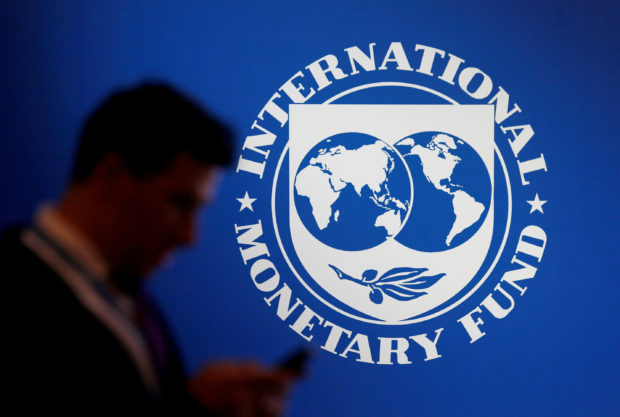
FILE PHOTO: A participant stands near a logo of IMF at the International Monetary Fund – World Bank Annual Meeting 2018 in Nusa Dua, Bali, Indonesia, October 12, 2018. REUTERS/Johannes P. Christo
Many companies in the Philippines have borrowings that are nearing the level where they may be unable to service their debts, the International Monetary Fund (IMF) warned.
The Washington-based multilateral lender said this as it observed that in Asia, increased borrowing in recent decades had raised the region’s exposure to rising interest rates and heightened market volatility.
In a commentary penned by Thomas Helbling, Shanaka Peiris and Monica Petrescu, the IMF said that across sectors in Asia—governments, companies, consumers and even financial firms—borrowings were well above levels before the global financial crisis of 2007-2008.
“In particular, industries that rapidly increased leverage while interest rates were low are now a key concern, especially in Asia,” the IMF team said.
“While we expect Asia’s growth to hold up, contributing two-thirds of global growth this year, central banks may keep rates higher for longer to tame inflation, and financial conditions may tighten further,” they added.
Susceptible to default
Citing their own data as well as those from Bloomberg and S&P Global Capital IQ, the IMF said that 3.3 percent of corporate groups in the Philippines have an interest cover ratio (ICR) of less than one. ICR is a measure of how much corporate earnings can cover debt interest payments.
When a company’s ICR is below or close to one, it may become unable to service its debts.
“The Philippines, Malaysia and Hong Kong had large shares of debt in companies with coverage ratios just above one, which could potentially become susceptible to default with rising borrowing costs,” the IMF team said. They added that across the region, a common theme is that a significant share of firms in the property and construction sector have interest coverage ratios close to or below one.
In the Philippines, only 21.9 percent of companies have an ICR of 4, which means they can comfortably meet their debt payments.
Vulnerabilities
Helbling and Peiries were among the IMF officials who attended earlier this month the Financial Stability Conference held in Cebu and cohosted by the Bangko Sentral ng Pilipinas.
In the same commentary, they said that corporate debt vulnerabilities in Asia were part of the discussions in Cebu.
“Financial supervisors must remain vigilant amid elevated uncertainty, high debt burdens, and rising debt service costs, and should recalibrate relevant macroprudential tools as needed to tackle pockets of vulnerability in the corporate sector,” they said. INQ

